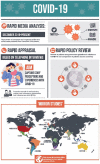Carrying Out Rapid Qualitative Research During a Pandemic: Emerging Lessons From COVID-19
- PMID: 32865149
- PMCID: PMC7649912
- DOI: 10.1177/1049732320951526
Carrying Out Rapid Qualitative Research During a Pandemic: Emerging Lessons From COVID-19
Abstract
Social scientists have a robust history of contributing to better understandings of and responses to disease outbreaks. The implementation of qualitative research in the context of infectious epidemics, however, continues to lag behind in the delivery, credibility, and timeliness of findings when compared with other research designs. The purpose of this article is to reflect on our experience of carrying out three research studies (a rapid appraisal, a qualitative study based on interviews, and a mixed-methods survey) aimed at exploring health care delivery in the context of COVID-19. We highlight the importance of qualitative data to inform evidence-based public health responses and provide a way forward to global research teams who wish to implement similar rapid qualitative studies. We reflect on the challenges of setting up research teams, obtaining ethical approval, collecting and analyzing data in real-time and sharing actionable findings.
Keywords: United Kingdom; anthropology; illness and disease; infectious; interviews; medical; methodology; qualitative; research design.
Conflict of interest statement
Figures
References
-
- Abramowitz S. A. (2014). How the Liberian health sector became a vector for Ebola. Fieldsights—Hot spots, cultural anthropology. http://www.culanth.org/fieldsights/598-how-the-liberian-health-sector-be...
-
- Anoko J. N. (2014). Removing a community curse resulting from the burial of a pregnant woman with the child in her womb: An anthropological approach during the epidemic of the Ebola virus disease in Guinea. 10.1007/978-3-319-97637-2_18 - DOI
-
- Beebe J. (1995). Basic concepts and techniques of rapid appraisal. Human Organization, 54(1), 42–51. 10.17730/humo.54.1.k84tv883mr2756l3 - DOI
-
- Beebe J. (2014). Rapid qualitative inquiry: A field guide to team-based assessment (2nd ed.). Rowman & Littlefield.
MeSH terms
LinkOut - more resources
Full Text Sources



